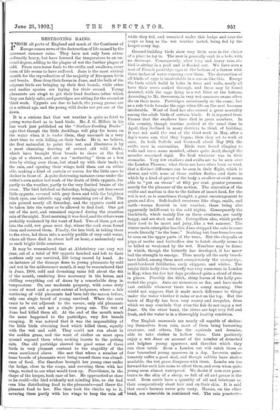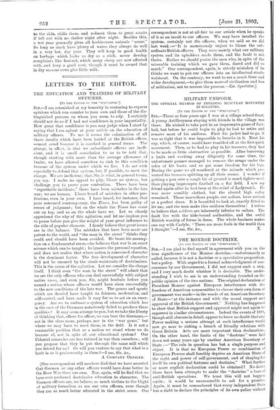• DESTROYING RAINS.
F4°Ilf parts of England and much of the Continent of Europe comes news of the destruction of life caused by the incessant summer rains. They have not only been extra- ordinarily heavy, but have lowered the temperature to an un- usual 'degree, adding to the plague of wet the further plague of cold. From race-horse foals to the swifts and swallows, every form of life seems to have suffered. June is the most critical month for the reproduction of the majority of European birds and beasts. Deer drop their fawns in June, and the bulk of the migrant birds are bringing up their first broods, while other and earlier species are laying for their second. Young pheasants are abopt to get their head feathers (after which they are fairly safe), and partridges are sitting for the second or third week. Cygnets are due to hatch, the young grouse are at a critical age, and the young wild ducks not yet out of the down.
It is a, curious fact that wet weather is quite as fatal to young water-fowl as to land birds. Mr. J. G. Millais in his line work just published on the "Surface-Feeding Ducks" says that though the little ducklings will play for hours on the water when it is under them, they succumb in a very short time to rain falling on their backs. He is, we believe, the first naturalist to point this out, and illustrates it by a most charming drawing of several old wild ducks, which have brought their broods to shore at the first sign of a shower, and are not "mothering" them as a lien does by sitting over them, but stand up with their backs to the rain, and opening their wings, hold them out on either side, making a kind of curtain or screen for the little ones to shelter in front of. A quite distressing instance came under the writer's own notice last week of the death of little cygnets, due partly to the weather, partly to the very limited brains of the swan. The bird batched on Saturday, bringing out four sweet little cygnets, covered with grey down and with the brightest black eyes, one infertile egg only remaining out of five. The rain poured nearly all Saturday, and the cygnets could not be taken into the water or be allowed to find food. One got out of the nest, and remained exposed during the ceaseless rain of the night. Next morning it was dead, and the others were probably weakened by the want of food. Two of them got out into the cold, wet grass next day, where the cock swan found them and covered them. Finally, the hen bird, in taking them to the river, led them into a muddy puddle of very cold water, where all three died in about half an hour, a melancholy end to such bright little creatures.
It may be remembered that at Abbotsbnry one very wet year, out of a total of 800 cygnets hatched and left to their mothers only one survived, 150 being reared by hand. As an instance of the damage done to young pheasants by cold and wet in the midsummer month, it may be remembered that in June, 1900, cold and drenching rains fell about the 4th of the month, rendering fires necessary in the house, and chilling everything out of doors by a remarkable drop in temperature. On one moderate property, with some sixty acres of wood and a great extent of hedgerow, where a fair scattering of wild pheasants had been left the season before, only one single brood of young survived. When the corn came to be cut adjacent to the covers, only old pheasants were put out, and not a single young one. The wet of June had killed them all. At the end of the month much the same happened to the partridges, very few broods escaping. It was noticed that it was the impossibility of the little birds obtaining food which killed them, equally with the wet and cold. They could not run about in the sodden grass, and the want of shelter on more open ground exposed them when seeking insects to the pelting rain. One old partridge showed the good sense of these birds in very pleasant contrast to the stupidity of the swan mentioned above. She saw that where a number of tame broods of pheasants were being reared there was abund- ance of food. She therefore brought her young ones under the hedge, close to the coops, and covering them with her wings, waited to see what would turn up. Providence, in the shape of the keeper, took care of her. He approached as close as he could—the bird evidently not minding him, as she had seen him distributing food to the pheasants—and threw the pheasant food to her. She then took the chicks up to it, covering them partly with her wings to keep the rain off
while they fed, and remained under this hedge and near the coops as long as the wet weather lasted, being fed by the keeper every day.
Ground-building birds show very little nous in the choice of a place to lay in. The nest is generally sunk in a hole, with no drainage. Consequently, after long and heavy rain, the bird is sitting in a pool and is flooded out. We have seen a nest of French partridge eggs at the bottom of a furrow with three inches of water running over them. The destruction of all kinds of eggs is incalculable in a season like this. Except the birds which build in boles in trees and walls, nearly all have their nests soaked through, and these may be found deserted, with the eggs lying in a wet litter at the bottom. According to Mr. Stevenson, in very wet summers swans often die on their nests. Partridges occasionally do the same ; but as a rule birds forsake the eggs when life on the nest becomes intolerable. Want of food has also caused a great mortality among the adult birds of certain kinds. It is reported front France that the swallows have died in great numbers. In this country, though martins arrived at the usual time in April, they declined in many districts to think of building. It was not until the end of the third week in May, after a day's warm sun, that they began; then they set to work at once. In both Suffolk and Cornwall about May 20th the swifts were in extremities. Birds were found clinging to walls and trees, some numbed, others quite dead, though the muscles remained rigid. No food whatever was in their stomachs. Very few swallows and swifts are to be seen over the London Thames ; what there are have often been so weak that a distinct difference can be seen in their flight, which is slower, and with none of those sudden flashes and darts in which by a kind of quiver of the body a swallow or swift seems able to "put on steam" at fifty per cent. greater pressure, merely for the pleasure of the motion. The starvation of the swifts and martins is due to the failure of insect food, for the wet is not., as is sometimes thought, a great encouragement to gnats and flies. Soft-bodied creatures like slugs, snails, and earth - worms flourish in wet weather, these being also apparently indifferent to the cold nights. Consequently the blackbirds, which mainly live on these creatures, are vastly happy, and are sleek and fat. Caterpillars also, which prefer their food to be moist and juicy, like a wet summer. The winter moth caterpillar has this June stripped the oaks in some woods literally "to the bone." Nothing but bare branches can be seen on the upper parts of the trees. But the chrysalis or pupa of moths and butterflies due to hatch shortly seems to be killed or weakened by the wet. Numbers may be found in which, though the butterfly has developed, it has never had the strength to emerge. Thus nearly all the early broods have failed, among them most conspicuously the orange-tips, pearl-bordered fritillaries, early skippers, and whites. The bright little holly-blue butterfly was very numerous in London in May, when the few hot days produced quite a cloud of them in places. Possibly the thick, shiny leaves of the holly pro- tected the pupa. Ants are numerous so far, and have made vast anthills whenever there was a sunny morning. One would not suppose that it made much difference to things under the water whether it rains or not on the top. But the hatch of May-fly has been very scanty and irregular, from which we may conclude that even the fish do not enjoy a wet June. On the other hand, the rivers are kept very full and fresh, and the water is in a thoroughly healthy condition.
Our English mammals are nearly all capable of shelter- ing themselves from rain, most of them being burrowing creatures, and others, like the squirrels and dormice, able to take shelter in hollow trees. Cats positively enjoy a wet June on account of the number of drenched and helpless young sparrows and thrushes which they can then catch. Even a London cat will catch three or four benumbed young sparrows in a day. Leverets unfor- tunately suffer a good deal, and though rabbits have shelter available, the wet grass disagrees with them. Lambs are too forward for such late rains to affect them, and even when quite young seem almost waterproof. We doubt if rain ever pene- trates to the skin of a sheep, so full of oil and grease is the wool. Even cattle have a quantity of oil and lubricant or. their comparatively short hair and on their skin. It is said that oxen's harness never gets rusty. Horses, on the other hand, are miserable in continued wet. The rain penetrates
to the skin, chills them, and reduces them to great straits if left out with no shelter night after night. Besides this, a wet year generally gives all herbivorous animals "scour." So long as stock have plenty of water, they always do well in a very hot, dry year. They will keep in good health on herbage which looks as dry as a stick, never develop complaints like foot-rot, which many lieep are now affected with, and keep a good coat, though it must be owned that in dry seasons cows give little milk.







































 Previous page
Previous page